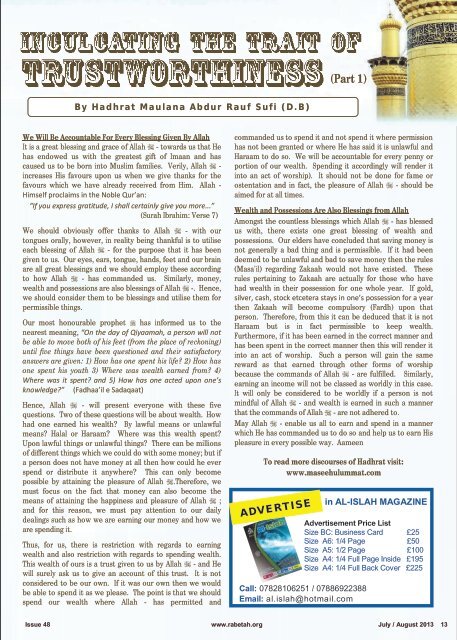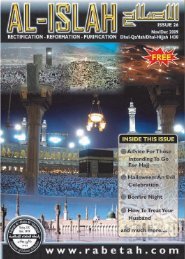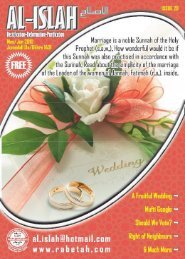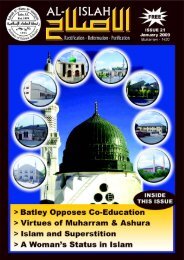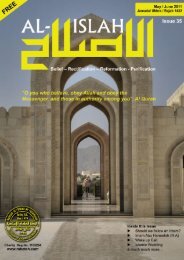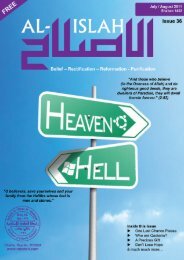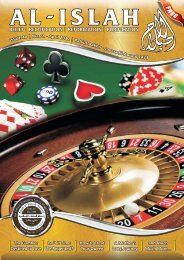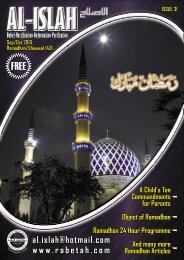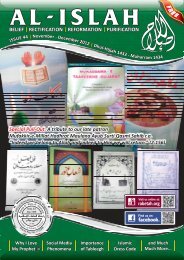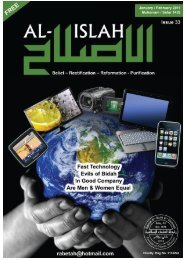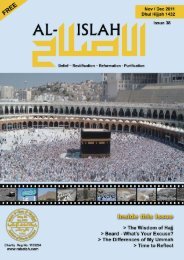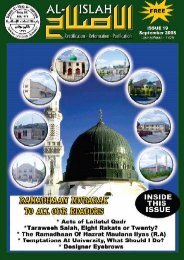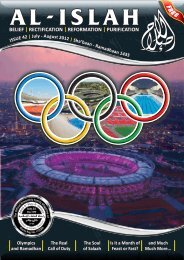Managment
Download (PDF, 4.8MB) - Rabetah
Download (PDF, 4.8MB) - Rabetah
- No tags were found...
You also want an ePaper? Increase the reach of your titles
YUMPU automatically turns print PDFs into web optimized ePapers that Google loves.
(Part 1)<br />
By Ha d hrat Mau lan a Ab dur Rau f S ufi (D. B)<br />
We Will Be Accountable For Every Blessing Given By Allah<br />
It is a great blessing and grace of Allah - towards us that He<br />
has endowed us with the greatest gift of Imaan and has<br />
caused us to be born into Muslim families. Verily, Allah -<br />
increases His favours upon us when we give thanks for the<br />
favours which we have already received from Him. Allah -<br />
Himself proclaims in the Noble Qur’an:<br />
“If you express gratitude, I shall certainly give you more...”<br />
(Surah Ibrahim: Verse 7)<br />
We should obviously offer thanks to Allah - with our<br />
tongues orally, however, in reality being thankful is to utilise<br />
each blessing of Allah - for the purpose that it has been<br />
given to us. Our eyes, ears, tongue, hands, feet and our brain<br />
are all great blessings and we should employ these according<br />
to how Allah - has commanded us. Similarly, money,<br />
wealth and possessions are also blessings of Allah -. Hence,<br />
we should consider them to be blessings and utilise them for<br />
permissible things.<br />
Our most honourable prophet has informed us to the<br />
nearest meaning, “On the day of Qiyaamah, a person will not<br />
be able to move both of his feet (from the place of reckoning)<br />
until five things have been questioned and their satisfactory<br />
answers are given: 1) How has one spent his life? 2) How has<br />
one spent his youth 3) Where was wealth earned from? 4)<br />
Where was it spent? and 5) How has one acted upon one’s<br />
knowledge?” (Fadhaa’il e Sadaqaat)<br />
Hence, Allah - will present everyone with these five<br />
questions. Two of these questions will be about wealth. How<br />
had one earned his wealth? By lawful means or unlawful<br />
means? Halal or Haraam? Where was this wealth spent?<br />
Upon lawful things or unlawful things? There can be millions<br />
of different things which we could do with some money; but if<br />
a person does not have money at all then how could he ever<br />
spend or distribute it anywhere? This can only become<br />
possible by attaining the pleasure of Allah .Therefore, we<br />
must focus on the fact that money can also become the<br />
means of attaining the happiness and pleasure of Allah ;<br />
and for this reason, we must pay attention to our daily<br />
dealings such as how we are earning our money and how we<br />
are spending it.<br />
Thus, for us, there is restriction with regards to earning<br />
wealth and also restriction with regards to spending wealth.<br />
This wealth of ours is a trust given to us by Allah - and He<br />
will surely ask us to give an account of this trust. It is not<br />
considered to be our own. If it was our own then we would<br />
be able to spend it as we please. The point is that we should<br />
spend our wealth where Allah - has permitted and<br />
commanded us to spend it and not spend it where permission<br />
has not been granted or where He has said it is unlawful and<br />
Haraam to do so. We will be accountable for every penny or<br />
portion of our wealth. Spending it accordingly will render it<br />
into an act of worship). It should not be done for fame or<br />
ostentation and in fact, the pleasure of Allah - should be<br />
aimed for at all times.<br />
Wealth and Possessions Are Also Blessings from Allah<br />
Amongst the countless blessings which Allah - has blessed<br />
us with, there exists one great blessing of wealth and<br />
possessions. Our elders have concluded that saving money is<br />
not generally a bad thing and is permissible. If it had been<br />
deemed to be unlawful and bad to save money then the rules<br />
(Masa'il) regarding Zakaah would not have existed. These<br />
rules pertaining to Zakaah are actually for those who have<br />
had wealth in their possession for one whole year. If gold,<br />
silver, cash, stock etcetera stays in one’s possession for a year<br />
then Zakaah will become compulsory (Fardh) upon that<br />
person. Therefore, from this it can be deduced that it is not<br />
Haraam but is in fact permissible to keep wealth.<br />
Furthermore, if it has been earned in the correct manner and<br />
has been spent in the correct manner then this will render it<br />
into an act of worship. Such a person will gain the same<br />
reward as that earned through other forms of worship<br />
because the commands of Allah - are fulfilled. Similarly,<br />
earning an income will not be classed as worldly in this case.<br />
It will only be considered to be worldly if a person is not<br />
mindful of Allah - and wealth is earned in such a manner<br />
that the commands of Allah - are not adhered to.<br />
May Allah - enable us all to earn and spend in a manner<br />
which He has commanded us to do so and help us to earn His<br />
pleasure in every possible way. Aameen<br />
To read more discourses of Hadhrat visit:<br />
www.maseehulummat.com<br />
ADVERTISE<br />
in AL-ISLAH MAGAZINE<br />
Advertisement Price List<br />
Size BC: Business Card £25<br />
Size A6: 1/4 Page £50<br />
Size A5: 1/2 Page £100<br />
Size A4: 1/4 Full Page Inside £195<br />
Size A4: 1/4 Full Back Cover £225<br />
Call: 07828106251 / 07886922388<br />
Email: al.islah@hotmail.com<br />
Issue 48 www.rabetah.org July / August 2013 13


